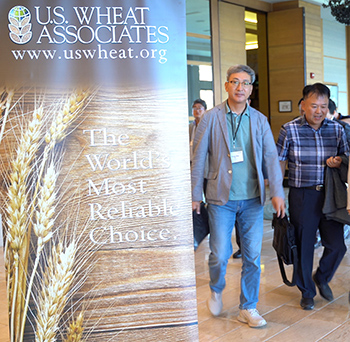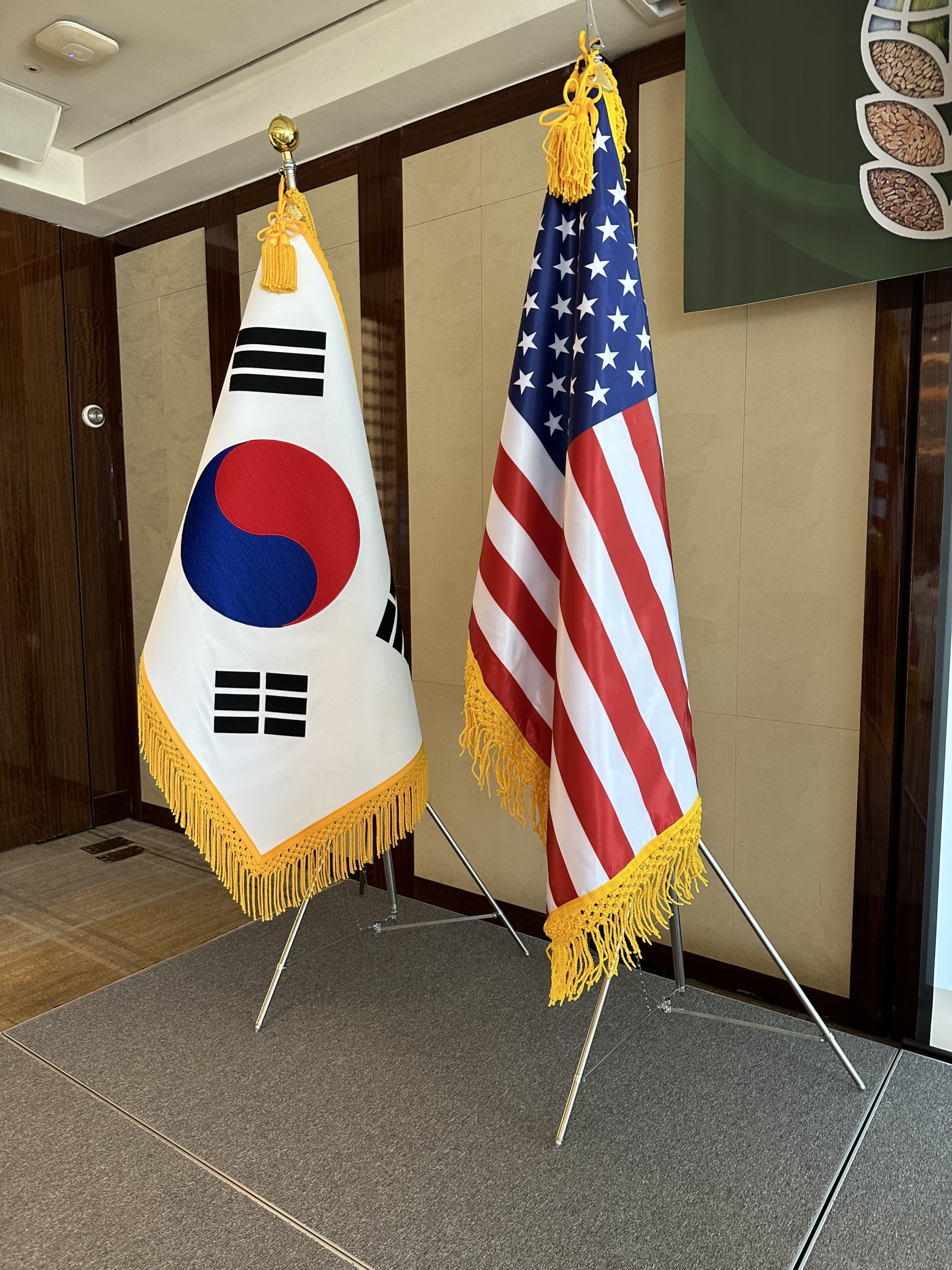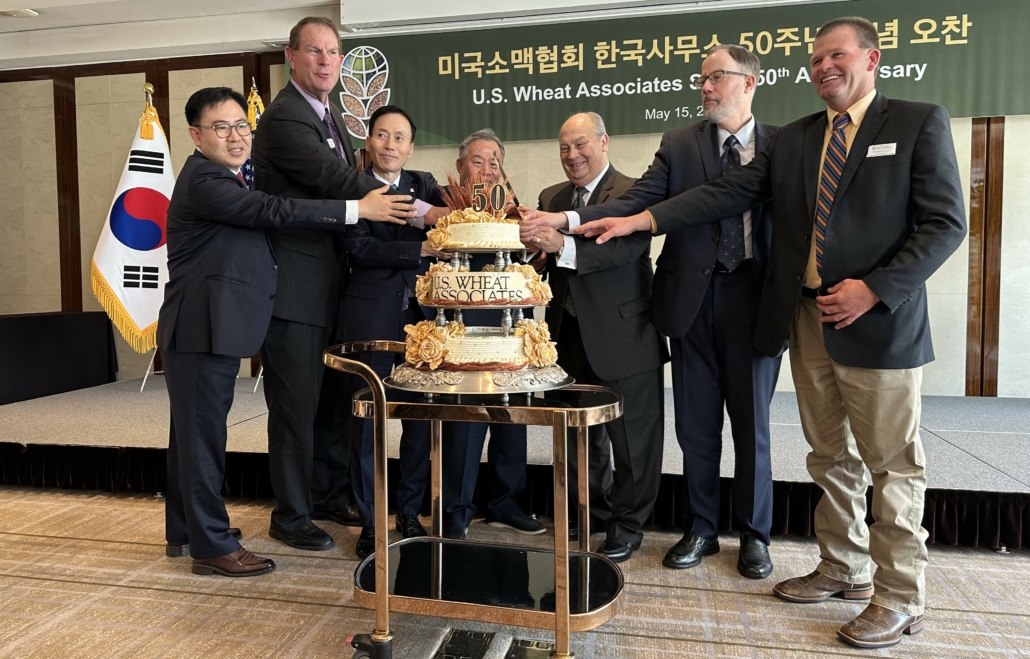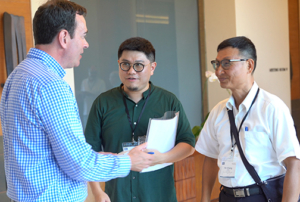
USW Vice President of Overseas Operations (left) meets a U.S. wheat customer from Taiwan (right) introduced by USW Taiwan Country Director Yi-I Huang during the 2023 USW North Asia Marketing Conference.
In an average year, buyers in Japan, South Korea and Taiwan import 20% of the U.S. wheat crop. It is an impressive statistic that speakers referenced more than a few times during the recent U.S. Wheat Associates (USW) North Asia Marketing Conference.
The two-day gathering that drew wheat buyers from all three countries to Bali, Indonesia, served as an example of USW’s ability to showcase U.S. wheat quality and key components of the industry’s efficient and effective supply chain efficiently.
Including, of course, the people who grow U.S. wheat.
“As a wheat farmer and a new wheat commissioner, this is my first trip overseas, and it didn’t take long to see the bonds U.S. wheat has built in these three markets,” said David Brewer, an Oregon wheat farmer who recently joined the Oregon Wheat Commission.
Speakers Covered All Bases
Conference participants also included USW staff from all three countries, USDA officials, and state wheat commission staff. The speakers selected by USW shared updates on crop production, crop quality outlooks, new technologies, financial forecasts, transportation issues and insights into the global wheat market.
USW President Vince Peterson pointed out that Japan, South Korea and Taiwan are three countries with separate cultures, industries and languages, yet they share a common interest in U.S. wheat.
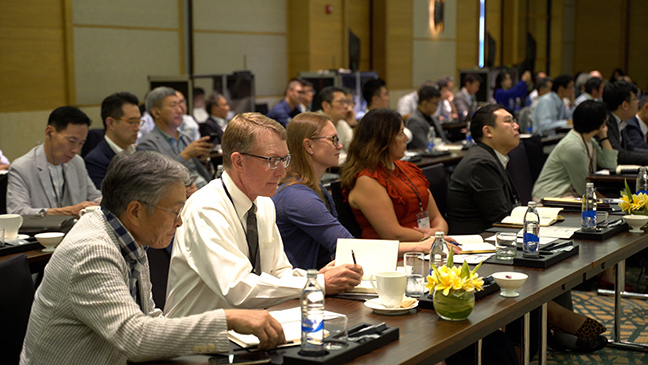
Oregon wheat farmer David Brewer (second from left) listens to speakers at the North Asia Marketing Conference.
“Bringing buyers from each country together in one place at one time is a tremendous experience and builds camaraderie amongst the three countries that I think helps us to market wheat to them collectively,” Peterson explained. “Japan, Korea and Taiwan each have customers that we have worked with for decades. We established some of these offices in the 1950s, so we have 60 or 70 years of experience and history with them.”
Customers Appreciate Information Sharing
Sang-Won Yong, an executive with Daehan Flour Mills in South Korea, expressed appreciation for USW’s ability to organize the conference. A long-time buyer of U.S. wheat, Yong found the opportunity to meet wheat industry people from the U.S. and flour millers from other countries in one place, at one time, both refreshing and encouraging.
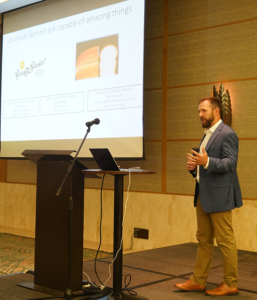
USW Vice President of Trade Policy Dalton Henry presents on new technologies in wheat production – a topic that attracted a lot of attention from wheat buyers from Japan, South Korea and Taiwan.
“Everyone at this conference was focused on the important things we deal with every day, and that is how to make our customers happy and how to keep our businesses going forward,” he said. “We all find U.S. wheat to be a big part of the formula to do what we do, to produce quality products for our customers. We’ve been able to rely on U.S. wheat farmers to produce the quality wheat we need.”
Quality is Top of Mind
Shojiro Kubota, Managing Executive Officer at Nitto Fuji Flour Milling in Tokyo, said Japanese consumers expect quality products. Using U.S. wheat has helped keep his company’s customers happy, so he finds value in hearing about the current U.S. wheat crop and other issues that affect the ability to purchase it.
“Things we learn from the speakers and presentations, and having conversations with those in the U.S. wheat industry is very helpful,” Kubota said. “The millers from each country may be looking for different types of wheat for different types of uses, but we have many of the same questions about importing wheat. It’s a great idea to bring all of us together.”
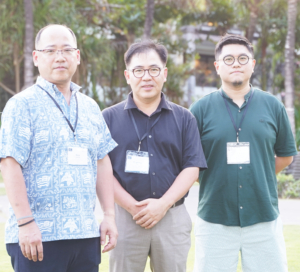
(left to right) Japan Country Director Rick Nakano, South Korea Country Director Dong-Chan “Channy” Bae and Taiwan Country Director Yi-I Huang pause for a photo during the welcome reception at the 2023 USW North Asia Marketing Conference.
Rick Nakano, Dong-Chan “Channy” Bae and Yi-I Huang – USW Country Directors from Japan, South Korea and Taiwan, respectively – each led groups of U.S. wheat customers to the conference, meeting individually with those customers to make sure all their questions were answered.
Farmers Happy to Answer Questions
Brewer and USW Chairman Michael Peters had several questions posed to them about the U.S. wheat crop and overall production across all six classes of U.S. wheat.
“I’ve actually had some of these buyers on my farm for trade team visits, and they were eager to hear about the crop situation back home,” said Brewer. “Seeing those same customers in their environment helps me understand how they make buying decisions.”
One thing that became evident to Brewer over the two days is how all the U.S. wheat classes are utilized.
“I’m a farmer from the northwest, but it makes me feel good to hear buyers from these important markets talking about wheat from Ohio, Texas, Kansas, Oklahoma and other states,” he said. “It reminds us that we are unified as farmers. When I get back home and have the chance to share what I learned in Asia, I will emphasize that our customers here really want to know what is available in the U.S. It’s all about the quality we produce.”

